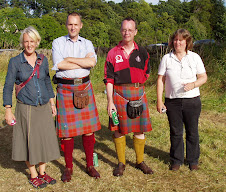All well, except that (as so often) I still have Italian
homework to do this evening. I’ve now done 16 ½ lace scallops – that’s ¾ of the
way along the first side of he shawl. There’s much to be said for getting all
this out of the way first. It’s an easy pattern to memorise, and I have found
it easy (so far) to figure out where I am when attention drifts. (EZ: "Look at
your knitting”.)
Andrew and Andrea this week. For once, I didn’t pursue it to
the end. The interview is with Clara Parkes. She is represented on my shelves.
I have read her latest book, “Vanishing Fleece”, which the interview concerns, on my Kindle app, and it’s good. But it ends with a suicide of a friend to which (if I remember
aright – I’m not going to look again) she reacts with sentimentality rather
than horror. I’ve been here just the other day with Dorothy Sayers. It’s not a
topic on which I can talk rationally.
Non-knit
I’m reading, with delight, Penelope Lively’s “How It All
Began”. The idea is the way a single event – the mugging of an elderly woman –
can have effects beyond imagining.
I’m having a bit of a creditability-problem with one
character, Anton, an educated man from an unnamed eastern European country, who
speaks intelligible English but can’t read. He is introduced in an adult
literacy class. Can that happen? With native English-speakers, yes – reading is
often difficult for fluent speakers. But – arguing only from my own struggles
with Italian – I would expect adults to find reading far easier than speaking a
second language.
However, that niggle doesn’t affect my pleasure with the
book.
Rachel rang up today, and – when we had finished with the
Calcutta Cup – we talked about “White House Farm” (see yesterday). Once, long
ago, goodness knows why, she went to court and heard Jeremy Bamber conduct one
of his appeals. She doesn’t remember much about it, except that it concerned
the gun and that she came away convinced of his guilt.
But she added that Bamber was acting on his own behalf,
whereas the Crown had a barrister. That may have told against him. I wonder if
they let him watch “White House Farm” in prison.



I quite enjoyed “How it All Began” It was my first of hers. Just wow in the last end on my sweater. I kept telling myself it was part of knitting and so I should just enjoy it. I didn’t really convince myself.
ReplyDeleteI read How It All Began last year. I agree, it's super. A lot of contemporary novels I find begin well but often don't hold up, but this one does.
ReplyDeleteDifferent alphabet?
ReplyDeletejennys
Is this another book to add to my long long list?
ReplyDeleteJean, the baby surprise pattern has arrived and I'm looking forward to knitting one. My children haven't obliged with grandchildren yet, but who knows how long it will take me to knit it anyway. Thank you very much indeed for copying and sending it.
It's half term for me. I'm still zonked by teaching, so reading Alison Utterly A Traveller in Time - children's book. About my intellectual level at the moment.
You would think that reading would be easier than speaking a language as it's possible to take more time. But it must also depend on how you have acquired or learned the language. People can be illiterate in their first language but able to speak it fluently. I suppose it is not unlike being a proficient piano player while being unable to read music. To me, the storyline could therefore be credible.
ReplyDeleteI would go with Jenny's theory on the different alphabet. For myself, I can read French very easily but barely manage to order a coffee when speaking it. I put this down to being taught it as A Level literature, reading it in French and writing essays in English. Those were the days.
ReplyDeleteTowards the end of primary shool, my daughter befriended a new girl who had been living in Portugal. This girl was bilingual, but for all her early school years, her playtimes and friendships had been in Portugese, and she found it hard to cope with her age group in English, as that had been the main language of interacting with adults.
ReplyDeleteMy eldest taught herself to read when she became impatient to have one more chapter of Laura Ingles' books read to her. (We caught her using a flashlight to read under the blankets.) She understood the impact/concept of some nouns, but couldn't pronounce them because she hadn't heard them yet. Gopher became "goofer", a small animal that threatened the crops. The choir became "chier" (long i) as they sang in the little church.
ReplyDeleteYes, I can believe an intelligent person could speak a language but be illiterate.